非谓语动词作状语讲解(学生版)
高考英语非谓语动词作状语的用法 知识点
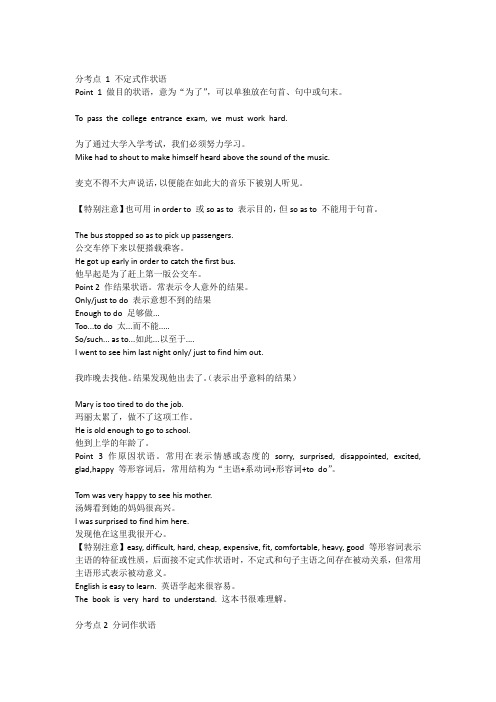
分考点1 不定式作状语Point 1 做目的状语,意为“为了”,可以单独放在句首、句中或句末。
To pass the college entrance exam, we must work hard.为了通过大学入学考试,我们必须努力学习。
Mike had to shout to make himself heard above the sound of the music.麦克不得不大声说话,以便能在如此大的音乐下被别人听见。
【特别注意】也可用in order to 或so as to 表示目的,但so as to 不能用于句首。
The bus stopped so as to pick up passengers.公交车停下来以便搭载乘客。
He got up early in order to catch the first bus.他早起是为了赶上第一版公交车。
Point 2 作结果状语。
常表示令人意外的结果。
Only/just to do 表示意想不到的结果Enough to do 足够做...Too...to do 太...而不能.....So/such... as to...如此...以至于....I went to see him last night only/ just to find him out.我昨晚去找他。
结果发现他出去了。
(表示出乎意料的结果)Mary is too tired to do the job.玛丽太累了,做不了这项工作。
He is old enough to go to school.他到上学的年龄了。
Point 3 作原因状语。
常用在表示情感或态度的sorry, surprised, disappointed, excited, glad,happy 等形容词后,常用结构为“主语+系动词+形容词+to do”。
Tom was very happy to see his mother.汤姆看到她的妈妈很高兴。
非谓语动词作状语全解讲解

非谓语动词作状语全解不定式和分词作状语的用法一、不定式作状语可以作:1. 主要用作目的状语。
常与 in order to do (为了或 so as to do(以便连用。
so as to 不用于居首。
He got up early in order to catch the first bus. 他早起为了赶上第一班车。
He sat down to have a rest.他坐下来休息。
He went to France to learn French。
他去法国学习法语。
They stood by the roadside to talk about the plan.他们站在路边为的是谈论这个计划。
They stopped to ask the way. 他们停下来问路。
(停下来的目的2.作结果状语。
表示出乎意料的结果。
做结果状语的不定式只能出现在句子的末尾,常见的不定式动词有:to find, to hear, to see, to be told, to form, to give, to make, to produce 等。
He hurried to the station only to find the train gone. 他匆匆忙忙地赶到火车站,发现火车已经开走了。
He woke up to find everybody gone. 他醒来发现大家都走了。
His family was too poor to support him.他的家庭太穷,不能维持他的生活。
The boy is not tall enough to reach the book shelf. 这男孩个子不够高, 手伸不到书架。
He is old enough to go to school. 他到上学年龄了。
He lifted a rock only to drop it on his own feet.他搬起石头砸了自己的脚。
非谓语动词做状语方法

非谓语动词做状语方法非谓语动词是指在句子中充当动词的形式,但不具备时态等谓语动词的特征。
非谓语动词主要有动词不定式、动名词和分词三种形式。
在句子中,非谓语动词可以充当状语,对动作或状态进行修饰和补充,使句子更加丰富和准确。
下面将介绍几种常见的非谓语动词做状语的方法。
一、动词不定式做状语动词不定式是由“to + 动词原形”构成的形式,在句子中可以作为状语来修饰动作或状态。
常见的动词不定式做状语的用法有以下几种:1. 作目的状语动词不定式可以表示动作的目的或出发点,常用的短语有“in order to”、“so as to”、“to”等。
例如:- I went to the supermarket to buy some groceries.- He studied hard in order to pass the exam.2. 作结果状语动词不定式可以表示动作的结果或后果,常用的短语有“so as to”、“to”等。
例如:- She ran fast to catch the bus.- He worked hard to earn more money.动词不定式可以表示动作的方式,常用的短语有“to”、“in order to”等。
例如:- They danced together to celebrate the victory.- He spoke loudly to make himself heard.4. 作原因状语动词不定式可以表示动作的原因,常用的短语有“for”、“to”等。
例如:- She apologized to him for being late.- He thanked her for helping him.二、动名词做状语动名词是由动词加上-ing构成的名词形式,具有动词和名词的特点,可以作为状语来修饰动作或状态。
常见的动名词做状语的用法有以下几种:1. 作原因状语动名词可以表示动作的原因,常用的短语有“by”、“by means of”等。
【中考英语一轮复习语法一点通】语法专题九 非谓语动词(学生版及答案)
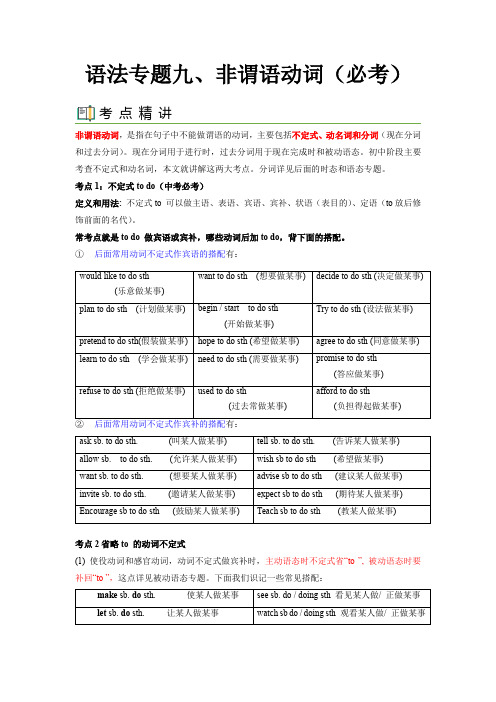
语法专题九、非谓语动词(必考)非谓语动词,是指在句子中不能做谓语的动词,主要包括不定式、动名词和分词(现在分词和过去分词)。
现在分词用于进行时,过去分词用于现在完成时和被动语态。
初中阶段主要考查不定式和动名词,本文就讲解这两大考点。
分词详见后面的时态和语态专题。
考点1:不定式to do (中考必考)定义和用法: 不定式to 可以做主语、表语、宾语、宾补、状语(表目的)、定语(to 放后修饰前面的名代)。
常考点就是to do 做宾语或宾补,哪些动词后加to do ,背下面的搭配。
① 后面常用动词不定式作宾语的搭配有: ② 后面常用动词不定式作宾补的搭配有: ask sb. to do sth. (叫某人做某事) tell sb. to do sth. (告诉某人做某事) allow sb. to do sth. (允许某人做某事) wish sb to do sth (希望做某事) want sb. to do sth. (想要某人做某事) advise sb to do sth (建议某人做某事) invite sb. to do sth. (邀请某人做某事) expect sb to do sth (期待某人做某事) Encourage sb to do sth (鼓励某人做某事) Teach sb to do sth (教某人做某事)考点2省略to 的动词不定式(1) 使役动词和感官动词,动词不定式做宾补时,主动语态时不定式省“to ”, 被动语态时要补回“to ”,这点详见被动语态专题。
下面我们识记一些常见搭配:make sb. do sth. 使某人做某事 see sb. do / doing sth 看见某人做/ 正做某事 let sb. do sth. 让某人做某事watch sb do / doing sth 观看某人做/ 正做某事 would like to do sth(乐意做某事)want to do sth (想要做某事) decide to do sth (决定做某事)plan to do sth (计划做某事)begin / start to do sth(开始做某事)Try to do sth (设法做某事)pretend to do sth(假装做某事) hope to do sth (希望做某事) a gree to do sth (同意做某事) learn to do sth (学会做某事) need to do sth (需要做某事)promise to do sth(答应做某事)refuse to do sth (拒绝做某事) used to do sth(过去常做某事)afford to do sth(负担得起做某事) 考点精讲have sb. do sth. 请某人做某事find sb do / doing sth.发现某人做/ 正做某事had better (not) do sth. 最好(不)做某事Hear sb do / doing sth. 听见某人做/ 正做某事prefer to do rather than do sth. 宁愿…而不愿would rather do sth. than do sth.宁愿做……而不愿Why don’t you do …?=Why not do sth.?为什么不做……?Would / could you please (not) do sth.?请你(不)……好吗?考点3 动名词(动词ing形式,作用相当于名词)动名词,顾名思义就是动词作名词用,在句中可做主语、宾语、表语、定语等。
高考英语非谓语动词语法讲解(推荐)

高考英语非谓语动词语法讲解(名师总结基础语法知识点,值得下载)【非谓语动词作状语】一.不定式,分词作状语的基本原则不定式,分词作状语时,不定式,分词的逻辑主语必须与句子的主语保持一致,即不定式,分词作状语时必须和句子的主语保持一致,即不定式,分词作状语时必须和句子主语含有逻辑上的主动或被动关系,否则一般不能使用不定式,分词作状语.二.不定式作状语1.不定式作目的状语不定式作目的状语的情况比较多,如果强调目的性时,不定式前还可加in order或so as,构成"in order to do"或"so as to do"结构."in order to do"结构作目的状语时,可以放在句首也可放在句中;"so as to do"结构只能放在句中.Her mother plans to fly to Beijing at least four times a year(so as/in order)to visit her.Bob took down my telephone number so as/in order not to forge t it.2.不定式作结果状语不定式作结果状语常用在下列句式中:so...as to;such...as to;...enough to;only to(常表示以外的或事与愿违的结果);too...to等.I'm not so stupid(a fool)as to write it down.Jane hurried back only to find that her mother had left.I'm too tired to stay up longer.备注:在only too..to结构中,too...to...并非是"太....而不能..."之意.此时,与too..to..搭配的形容词常见的有pleased,ready,willing,glad,happy等.I'm only too glad to have passed the exam.3.不定式作原因状语形容词作表语时,后面可接不定式作原因状语,用以说明产生这种情绪的原因.用于这类结构中的形容词常见的有:happy,glad,sorry,anxious,proud,disappointed,angry,surprised,ready,delighted,pleased等.You will never know how happy I was to see her yesterday.4.在"主语+系动词+表语(形容词)+to do"结构中,句子的主语与动词不定式有逻辑上的被动关系,且形容词表示主语的特征或性质,这时,需用不定式的主动形式表示被动意义.该结构中常用的形容词有:easy,hard,difficult,important,impossible,interesting,pleasant,nice,comfortable,safe,dangerous等.This question is easy to answer.This book is difficult to understand.三.分词作状语1.分词作状语时其形式的选择形式意义v-ing(doing) 与句子主语为逻辑上的主动关系,与句子谓语动词动作同时发生,或基本上同时发生having+v-ed(having done) 与句子主语为逻辑上的主动关系,先于谓语动词动作发生v-ed(done) 与句子主语为逻辑上的被动关系,表完成being+v-ed(being done) 与句子主语为逻辑上的被动关系,且与谓语动词动作同时发生与句子主语为逻辑上的被动关系,且先于谓语动词动作发生having been+v-ed(havingbeen done)2.分词作状语的句法功能分词作状语时,可以表时间,原因,结果,条件,让步,行为方式,伴随状况等.为了强调,还可与while,when,once,if,unless等连词连用.When offered help,one often says"Thank you"or "It's kind of you".(时间)Separated from other continents for millions of years,Australia has many plants and animals not found in any other country in the world.(原因)Generally speaking,if taken according to the directions,the drug has no side effect.(条件)He glanced at her,nothing that though she was tiny,she seemed very well.(结果)Having been told many times,he still repeated the same mistake.(让步)The teacher came into the lab,followed by some students.(伴随)四.独立成分作状语有些分词或不定式短语作状语,其形式的选择不受上下文的影响,称作独立成分.常见的有:generallyspeaking一般来说;frankly speaking坦白地说;judging from/by...根据....来判断;considering.../taking....into consideration考虑到.....;to tell you the truth说实话;compared to/with与....相比.Judging from his accent,he is from Hong Kong.Considering your health,you'd better have a rest.To tell you the truth,I am a little tired.五.独立主格结构非谓语动词作状语时,它的逻辑主语应和句子主语保持一致.但有时非谓语动词带有自己的逻辑主语,在句子中作状语,我们称之为独立主格结构.独立主格结构的特点:①独立主格结构的逻辑主语与句子的主语不同,它独立存在.②独立主格结构中作逻辑主语的名词或代词与后面的分词或不定式是逻辑上的主动或被动关系.③独立主格结构一般有逗号与句子分开.独立主格结构的构成:①名词/代词+分词②名词/代词+不定式③with/without+名词/代词+分词/不定式The test finished(=When the test was finished),we began our holiday.The president assassinated(=Because the president was assassinated),the whole country was in deep sorrow.Weather permitting(=If weather permits),we are going to visit you tomorrow.I stood before her with my heart beating fast.【练一练】①Anxiously,she took the dress out of the package and tried it on,only (find)it didn't fit.②Clearly and thoughtfully (write),the book inspires confidence in students who wish to seek their ownanswers.③Group activities will be organized after class (help)children develop team spirit.④(spend)the past year as an exchange student in Hong Kong,Linda appears more mature than thoseof her age.⑤The lecture (give),a lively question-and-answer session followed.【非谓语动词作定语】一.不定式作定语1.作定语的不定式如果是不及物动词,或者不定式所修饰的名词或代词是不定式动作的地点,工具等,不定式后面需有相应的介词.The Browns have a comfortable house to live in.He had no place to live.2.用不定式作定语的几种情况:①不定式表将来The car to be bought is for his sister.②用来修饰被序数词,最高级或no,all,any等限定的中心词,且与中心词为逻辑上的主动关系.He was the best man to do the job.She was the first woman to win the gold medal in the Olympic Games.③有些名词的同根词常跟不定式,因而它们也常跟不定式作定语,常见的有:promise,plan,attempt,offer,decision,refusal,failure,ability,chance,warning,anxiety,eagerness,willingness,readiness等.I don't trust his promise to come for a visit.He said he had no plans to go there.He made an attempt to stand up.二.分词作定语1.作定语的及物动词的分词形式为:v-ing,being+过去分词和过去分词.当被修饰的名词与非谓语动词为主动关系时,用v-ing;当被修饰的名词与非谓语动词为被动关系且表正在进行时,用being+过去分词;当被修饰的名词与非谓语动词为被动关系且表完成时,用过去分词.The houses being built are for the teachers.(被动,正在进行)2.作定语的不及物动词的分词形式为:v-ing和过去分词.v-ing表示正在进行;过去分词表示已经完成.boiling water沸腾的水(表示正在进行)boiled water白开水(表完成)falling leaves正在下落的叶子(表正在进行)fallen leaves已经落下的叶子(表完成)developing countries发展中国家(表正在进行)developed countries发达国家(表完成)三.to be done,done和being done作定语的区别to be done表被动,将来;done表被动,完成;being done表被动,正在进行.Have you read the novel written by Dickens? (表被动,完成)Listen!The song being sung is very popular with the students.(表被动,正在进行)The question to be discussed at tomorrow's meeting is very important.(表被动,将来)【练一练】①There are still many problems (solve)before we are ready for a long stay on the Moon.②Prices of daily goods (buy)through a computer can be lower than store prices.③The flowers (smell)sweet in the botanic garden attract the visitors to the beauty of nature.【非谓语动词作宾语,补语,主语,表语】一.非谓语动词(不定式,动名词)作宾语1.下列动词一般用不定式作宾语,请牢记下面的口诀:决心学会想希望,拒绝设法愿假装.主动答应选计划,同意请求帮一帮.decide/determine,learn,want,expect/hope/wish;refuse,manage,care,pretend;offer,promise,choose,plan;agree,ask/beg,help.She pretended not to see me when I passed by.We agreed to meet here but so far she hasn't turned up yet.此外,afford,strive,happen,wait,threaten等也要用不定式作宾语.2.下列动词或词组一般用动名词作宾语,请牢记下面的口诀:考虑建议盼原谅,承认推迟没得想.避免错过继续练,否认完成就欣赏.禁止想象才冒险,不禁介意准逃亡.consider,suggest/advise,look forward to,excuse/pardon;admit,delay/put off,fancy(想象,设想);avoid,miss,keep/keep on,practice;deny,finish,enjoy/appreciate;forbid,imagine,risk;can't help(禁不住),mind,allow/permit,escape.He got well-prepared for the job interview,for he couldn't risk losing the good opportunity.此外,be used/accustomed to,lead to,devote to,go back to,stick to,object to,get down to,pay attention to,can't stand(无法忍受),give up,feel like,insist on,be busy,have difficulty(in),have a good/wonderful/hard time(in),spend time (in)等短语后也要用动名词作宾语.3.下列动词或词组既可以跟动名词作宾语,也可以跟不定式作宾语,但意义上有区别,要特别注意.to do sth.忘记要做某事forgetdoing sth.忘记已经做过某事to do sth.记着要做某事rememberdoing sth.记得曾经做过某事to do sth.努力做某事regretdoing sth.后悔做过某事to do sth.努力做某事trydoing sth.试着做某事to do sth.打算做某事meandoing sth.意味着做某事4.在动词allow,advise,forbid,permit,consider后直接跟动名词作宾语;如果后面有名词或代词作宾语,则用动词不定式作宾语补足语sb.to do sth.allow/permit/forbid/advise/considerdoing sth.Smoking is forbidden here so we don't allow you to smoke.We don't allow smoking in the wall.5.动词need,require,want作"需要",deserve作"应受,应得"解时,其后用动名词的主动形式(doing)或不定式的被动形式(to be done)表被动意义.be worth后用动名词的主动形式(doing)表示被动意义, 而worthy则需用被动形式.此外,need,require,want后可以接名词或代词作宾语,然后接不定式作宾语补足语,表示"需要/要求/想要某人做某事".to be done(需要)need/require/want doingsb.to do sth.(需要/要求/想要)名词deserve doingto be done名词be worth doingto be donebe worthy名词(表钱数或表价格的名词除外)ofbeing doneto be cleanedThe window needs/requires/wantscleaningworth visitingto be visitedThis place is worthya visitofbeing visitedconsideringThese proposals deserveto be considered6.不定式作动词(词组)tell,show,understand,explain,teach,learn,advise,discuss,ask,decide,wonder,find out等的宾语时,前面常带引导词how,what,whether,where,when,who等,但why后加不带to的不定式.备注:此用法中的不定式的逻辑主语需与句子的主语或宾语保持一致,否则用宾语从句.He showed us how to do the work.(=He showed us how we should do the work)I don't know what to do.(=I don't know what I should do.)We must decide whether to stay or go.(=We must decide whether we'll stay or go)Can you tell me why do it?①The film star wears sunglasses.Therefore,he can go shopping without (recognize).②One learns a language by making mistakes and (correct)them.③In some parts of London,missing a bus means (wait)for another hour.二.非谓语动词作补语1.后接不定式作补语的动词及动词词组advise,allow,ask,beg,cause,encourage,expect,forbid,force,get,intend,invite,love,order,persuade,prefer,remind,require,tea ch,tell,want,warn,wish,wait for,call on,depend on等.You are not allowed to smoke here.The doctor warned him not to eat too much meat.注意:think,consider,believe,suppose,feel,find,imagine,prove,appoint,judge等后常用"to be..."作宾补/主补People considered him to be a great leader.They found the answer to be quite satisfactory.Chinese food is considered to be the healthiest in the world.He imagines himself to be an able man.2.非谓语动词作感官动词(词组),使役动词的宾补listen to,feel的宾语补足语有四种形式,以see为例:doing sth.看见....正做....(宾语与宾补为逻辑上的主动关系)do sth.看见...做了....see+宾语+ being done看见....正在做(宾语与宾补为逻辑上的被动关系)done看见....被做I heard her sing an English song just now.(主动,完成)I heard her singing an English song when I passed by her room yesterday.(主动,正在进行)I heard an English song being sung by the little girl when I passed by her room yesterday.(被动,正在进行)I'd like to see the plan carried out.(被动,没有一定的时间性)2.使役动词make,let,have,get后接复合宾语的情况.do让...做....(宾语与宾补为逻辑上的主动关系)①make+宾语+done让...被做(宾语与宾补为逻辑上的被动关系)He made his workers work 12 hours a day.He tried to make himself understood.do让.....做.....(宾语与宾补为逻辑上的主动关系)②let+宾语+be done让....被做(宾语与宾补为逻辑上的被动关系)Don't let your child play with matches.Let the work be done immediately.do sth.让...做某事doing sth.使....持续做某事(宾语与宾补为逻辑上的主动关系) ③have+宾语+done使....被做(宾语与宾补为逻辑上的被动关系)备注: ⑴.have sth. done还表示"使....遭受..."之意Tom had his leg broken while playing football.Mr.Smith had his house broken into while he was away on holiday.⑵have sb. doing常用于否定句中,其中have有"允许,容忍"之意.I won't have you speaking to your dad like that.⑶have还可用于have sth. to do结构,该结构中have作"有"讲,不定式作定语.I have something urgent to inform you.to do sth.使....做doing sth.使...做(宾语与宾补为逻辑上的主动关系)⑷.get+宾语+done使....被做(宾语与宾补为逻辑上的被动关系)He got me to post the letter for him.The captain got the soldiers moving toward the front after a short rest.I'll get my bike repaired tomorrow.3.下列动词(词组)在主动语态中用不带to的不定式作宾语补足语,但在被动语态中要加上to;它们是"吾看三室两厅一感觉"-5看(look at,see,watch,notice,observe);3使(make,let,have);2听(listen to,hear);1感觉(feel) Someone was heard to come up the stairs.(三)动词leave,keep,find,catch及介词with后加非谓语动词作复合宾语的情况:sb./sth. doing sth.让某人/物一直处于某种状态(宾语与宾语补足语之间是逻辑上的主动关系,表示动作正在进行)sth. undone留下某事未做(宾语与宾语补足语之间是逻辑上的被动关系,表示被动和完成,一般以undone,unfinished,unsettled,untouched为多)1.leavesb. To do sth.让某人去做某事(不定式表示将来的动作)sth. To be done.留下某事要做It's wrong to leave the machine running.(主动,正在进行)The guests left most of the dishes untouched,because they didn't taste delicious.(被动,完成)He left,leaving me to do all the rest work.(主动,将来)We hurriedly ended our meeting,leaving many problems to be settled.(被动,将来)sb./sth. doing使某人/物一直做某事2.keepsb./sth. done使某人/物被......(表示被动且完成,或表示状态)Keep the engine running.You should keep me informed of his whereabouts.sb. doing发现某人正在做某事3.find sb/sth. done发现某人/物.....(表完成或状态)sb./sth.(to be)...发现某人/物....We found him(to be)dishonest.Often I found her quietly weeping alone.I found him buried in a novel.4.catch sb. doing sth.撞见某人正在做某事I caught John reading my private letters.sb./sth. doing(表主动且进行,或表特征)sth. being done(表被动且进行)5.with sth. done(表被动且完成,或表状态)sth. to do(表示将来)John received an invitation to dinner,and with his work finished,he gladly accepted it.With a lot of difficult problems to settle,the newly elected president is having a hard time.(四)常用不定式作主语补足语的句型Sb. be said/believed/known/supposed/reported/considered/found/thought+to do/to have done/to be done/to have been done+其他.He is said to have gone abroad.(=It is said that he has gone abroad.)Heat is considered to be a form of energy.You're supposed to pay the bill by Friday.④The managers discussed the plan that they would like to see (carry)out the next year.11。
高考英语之非谓语动词作状语
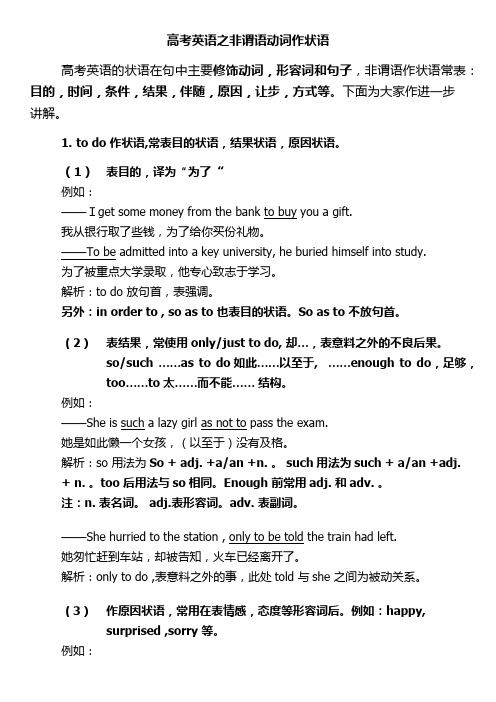
高考英语之非谓语动词作状语高考英语的状语在句中主要修饰动词,形容词和句子,非谓语作状语常表:目的,时间,条件,结果,伴随,原因,让步,方式等。
下面为大家作进一步讲解。
1.to do 作状语,常表目的状语,结果状语,原因状语。
(1)表目的,译为“为了“例如:——Iget some money from the bank to buy you a gift.我从银行取了些钱,为了给你买份礼物。
——To be admitted into a key university, he buried himself into study.为了被重点大学录取,他专心致志于学习。
解析:to do 放句首,表强调。
另外:in order to , so as to 也表目的状语。
So as to 不放句首。
(2)表结果,常使用only/just to do, 却…,表意料之外的不良后果。
so/such ……as to do如此……以至于, ……enough to do,足够,too……to太……而不能……结构。
例如:——She is such a lazy girl as not to pass the exam.她是如此懒一个女孩,(以至于)没有及格。
解析:so 用法为So + adj. +a/an +n. 。
such用法为such + a/an +adj.+ n. 。
too 后用法与so相同。
Enough 前常用adj. 和adv. 。
注:n. 表名词。
adj.表形容词。
adv. 表副词。
——She hurried to the station , only to be told the train had left.她匆忙赶到车站,却被告知,火车已经离开了。
解析:only to do ,表意料之外的事,此处told 与she 之间为被动关系。
(3)作原因状语,常用在表情感,态度等形容词后。
例如:happy,surprised ,sorry 等。
非谓语总结之作状语(一)

非谓语总结之作状语(一)一、含义非谓语动词,顾名思义就是不作谓语的动词本质上也是由动词变化而来,但为了与动词区分,在形式上与动词有所区别。
有三种变形1.to do 也就是不定式2.doing 现在分词/动名词3.done过去分词4.按照大体的词性,可以分成三类,非谓语在句子中的作用是使谓语之外的其他句子成分,如主语、宾语、谓语、宾语补足语、状语、定语、同位语。
这篇文章主要讲,非谓语作状语。
状语用来修饰动词、形容词、副词以及原因、方式、时间、地点、目的、程度等。
句子。
只有分词和不定式可以作状语,(动名词不能做状语。
顾名思义,动名词不能做状语。
如果把动词换成名词,就相当于名词,名词不能做状语。
副词常用作状语。
)先说不定式作状语表原因,目的,结果(谐音记忆:不(不定式)状(状语),因目果意思就是,为什么不说话,因为我的眼睛只有苹果)〔1〕不定式作原因状语关键点是:基本结构中的主系表,表语是有表示心情状态形容词充当,如:开心,伤心……•例: I am so happy to see you.•因为见到你我很高兴〔2〕不定式作目的状语这个不用我说,大家一看到不定式,最开始想的就是目的状语•例:I study hard to server people well.•我努力学习是为了更好地为人民服务。
〔3〕不定式作结果状语关键点:意料之外的结果•例:I hurried to school, only to find the gatelocked.•我匆忙赶到学校,却发现门锁着。
分词作状语〔主动用doing,被动用done〕表原因,条件,时间,让步,方式,伴随,结果。
〔谐音巧记:因挑食(时间)让柿(方式)拌着果〕〔1〕分词作原因状语•例:Being ill, he didn't go to school.•因为生病了,他没去学校。
•主语是he,他与ill的关系是他生病,主动,用现在分词。
〔2〕分词作条件状语•例:Working hard, you will surely succeed.•如果你努力,你将取得成功。
非谓语做状语课件

填空题练习
总结词
检验学生对非谓语做状语的掌握程度 。
详细描述
填空题会提供句子的一部分,让学生 填写合适的非谓语动词形式,以补全 句子。这种题型有助于学生理解非谓 语在句子中的实际应用。
改错题练习
总结词
提高学生识别和纠正非谓语错误的能力 。
VS
详细描述
改错题会提供包含非谓语错误的句子,学 生需要识别并纠正错误,这种题型有助于 学生深入理解非谓语的正确用法,提高语 言运用的准确性。
非谓语做状语课件
THE FIRST LESSON OF THE SCHOOL YEAR
目录CONTENTS
• 非谓语做状语的定义与类型 • 非谓语做状语的功能 • 非谓语做状语的语法规则 • 非谓语做状语的常见错误分析 • 非谓语做状语的练习与解析
01
非谓语做状语的定 义与类型
定义
01
非谓语做状语是指非谓语动词在 句子中用作状语,表示动作或状 态的方式、时间、条件、让步等 关系。
混淆非谓语做状语与并列句
总结词
非谓语做状语与并列句之间的区别也是常见的误区之一。
详细描述
并列句是由并列连词连接的两个或多个独立分句,而非谓语做状语则是修饰整个 主句的,两者在语法结构和功能上存在明显差异。在分析句子时,应注意区分两 者,避免混淆。
混淆非谓语做状语与主句
总结词
将非谓语做状语误认为是主句也是常 见的错误之一。
01
非谓语做状语的常 见错误分析
混淆非谓语做状语与定语从句
总结词
混淆非谓语做状语与定语从句是常见的错误之一,因为两者在语法结构和功能 上存在相似之处。
详细描述
非谓语做状语通常表示时间、条件、原因、让步等关系,而定语从句则用于修 饰名词或代词,表示所属、性质、状态等关系。在分析句子时,应注意区分两 者,避免混淆。
非谓语动词做状语(讲课用)

3. When the library is completed, it will be open to the public next year. _________________ When completed, the library will be open to the public next year. 4.When she was asked why she did it,
she began to cry. Asked why she did it, they kept running. __________________
5.The children came into the classroom,
and they laughed and talked.(并列句)
Even if what we need is just a glass of water, she will also keep it in mind. When ________(notice) noticing her grey hairs and the wrinkles around her eyes, I realize I have grown up while she is no longer young. It’s time that I should do something for her, even only _______(give) back some messages making giving or ________(make)a cup of tea for her. It can make her feel that she seems to be the happiest woman in the world. Do you know who she is? She is our Mom
非谓语动词作状语技巧
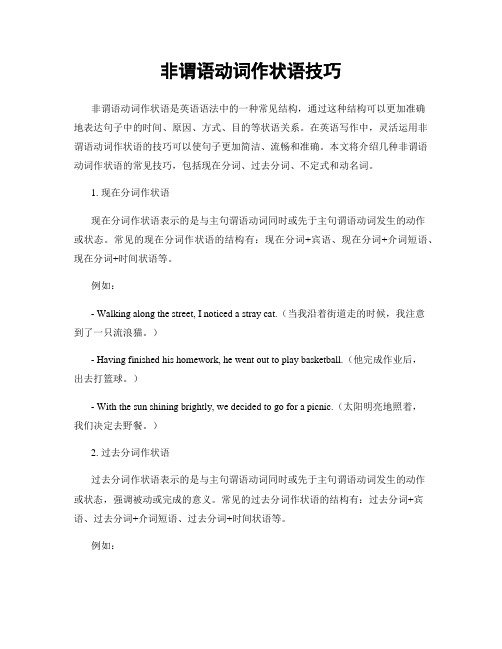
非谓语动词作状语技巧非谓语动词作状语是英语语法中的一种常见结构,通过这种结构可以更加准确地表达句子中的时间、原因、方式、目的等状语关系。
在英语写作中,灵活运用非谓语动词作状语的技巧可以使句子更加简洁、流畅和准确。
本文将介绍几种非谓语动词作状语的常见技巧,包括现在分词、过去分词、不定式和动名词。
1. 现在分词作状语现在分词作状语表示的是与主句谓语动词同时或先于主句谓语动词发生的动作或状态。
常见的现在分词作状语的结构有:现在分词+宾语、现在分词+介词短语、现在分词+时间状语等。
例如:- Walking along the street, I noticed a stray cat.(当我沿着街道走的时候,我注意到了一只流浪猫。
)- Having finished his homework, he went out to play basketball.(他完成作业后,出去打篮球。
)- With the sun shining brightly, we decided to go for a picnic.(太阳明亮地照着,我们决定去野餐。
)2. 过去分词作状语过去分词作状语表示的是与主句谓语动词同时或先于主句谓语动词发生的动作或状态,强调被动或完成的意义。
常见的过去分词作状语的结构有:过去分词+宾语、过去分词+介词短语、过去分词+时间状语等。
例如:- Exhausted from the long journey, she went straight to bed.(因为长途旅行而疲惫不堪,她直接上床睡觉。
)- Having been invited to the party, I couldn't refuse.(因为被邀请参加派对,我不能拒绝。
)- Surprised by the sudden news, they didn't know how to react.(因为突然的消息,他们不知道如何反应。
非谓语动词作状语讲解

非谓语动词作状语讲解非谓语动词是指动词的非谓语形式,包括动词不定式、动名词和分词。
它们在句子中可以充当状语,用来修饰动词、形容词、副词或整个句子。
本文将对非谓语动词作状语的使用进行详细讲解。
一、动词不定式作状语动词不定式一般由“to + 动词原形”构成,常用作目的状语、结果状语和方式状语。
1. 目的状语动词不定式作目的状语时,表示动作的目的或意图。
常见的句式有:in order to / so as to + 动词原形,例如:- He works hard in order to earn more money.- She took the train so as to arrive on time.2. 结果状语动词不定式作结果状语时,表示结果或后果。
常见的句式有:so +形容词/副词 + as to + 动词原形,例如:- He was so tired as to fall asleep immediately.- The problem is so difficult as to require professional help.3. 方式状语动词不定式作方式状语时,表示动作的方式或方法。
常见的句式有:by + 动词不定式,例如:- They learned English by watching movies.- He solved the puzzle by using his intelligence.二、动名词作状语动名词以-ing形式构成,常用作原因状语、时间状语和方式状语。
1. 原因状语动名词作原因状语时,表示句子的原因或动作发生的原因。
常见的句式有:by + 动名词,例如:- She managed to pass the exam by studying hard.- He improved his skills by practicing every day.2. 时间状语动名词作时间状语时,表示动作发生的时间。
非谓语动词作状语公开课课堂ppt课件.ppt
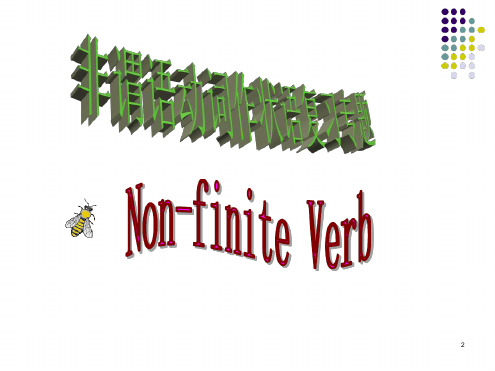
4
寒假来临 ,不少 的高中 毕业生 和大学 在校生 都选择 去打工 。准备 过一个 充实而 有意义 的寒假 。但是 ,目前 社会上 寒假招 工的陷 阱很多
一般式
to do
to do
v.ing
doing
一般被 动式
to be done
being done
非谓语动词作状语 解题四大步骤?
17
寒假来临 ,不少 的高中 毕业生 和大学 在校生 都选择 去打工 。准备 过一个 充实而 有意义 的寒假 。但是 ,目前 社会上 寒假招 工的陷 阱很多
例题
at the cafeteria before, Tina didn't want to eat there again.
方法总结: 谓非谓,找主语,析语态,定时态
21
_L_o_o_k_in_g__ (look) at her, he jumped with joy. _L_o_o_k_e_d__(look) at by her, he jumped with joy.
14
寒假来临 ,不少 的高中 毕业生 和大学 在校生 都选择 去打工 。准备 过一个 充实而 有意义 的寒假 。但是 ,目前 社会上 寒假招 工的陷 阱很多
10
寒假来临 ,不少 的高中 毕业生 和大学 在校生 都选择 去打工 。准备 过一个 充实而 有意义 的寒假 。但是 ,目前 社会上 寒假招 工的陷 阱很多
3.不定式作结果状语
1. The train was caught in heavy snow ,
_c_a_u__si_n_g__(cause)the delay.
A. Having eaten C. Eaten
非谓语动词.学生版

初中英语基础模块06——非谓语动词非谓语动词能够熟练掌握非谓语动词的基本的用法在北京中考中要求考生对非谓语动词的掌握往往集中在对固定用法的考查上。
内容基本要求非谓语动词一、非谓语动词的三种形式;二、非谓语动词的用法;三、非谓语动词中需要注意的一些问题。
根据英语动词在句中是否独立用作谓语,可以把动词分为谓语动词和非谓语动词两种。
谓语动词是指动词在句中独立作谓语时采用的形式,如各种时态的形式;非谓语动词是指动词在句中不独立作谓语时采用的形式,包括不定式、动名词和分词(现在分词、过去分词)三种。
考点一:动词不定式 1.不定式形式动词不定式的基本形式是“to +动词原形”,称为带 to 的不定式。
如:He wanted to sit down. 他想坐下。
(带 to 的不定式)Let him sit down. 让他坐下。
(不带 to 的不定式)注意:这里的 to 只是个语法符号,没有词义。
不定式在句中不能独立做谓语,也没有人称和数的变化。
易错点:动词不定式否定形式:not + (to) + do2.不定式的基本用法动词不定式虽然是动词的一种形式,但是它却具有名词、形容词和副词的功能,因此在句中可以用作主语、表语、宾语、宾语补足语(宾补)、定语、状语等。
满分必备攻略命题人怎么想中考怎么考①用作主语:不定式做主语时,常用it 做形式主语,而将真正的主语放在句末,其结构为It is + adj. + (for/ of) + 动词不定式。
如:To learn a foreign language is not easy. It is not easy to learn a foreign language.To help the poor is his duty. It is his duty to help the poor.注意:在kind; good; nice; clever 等表示人的品质的形容词后,不用for 而用of。
高中英语知识点归纳非谓语动词作状语的形式
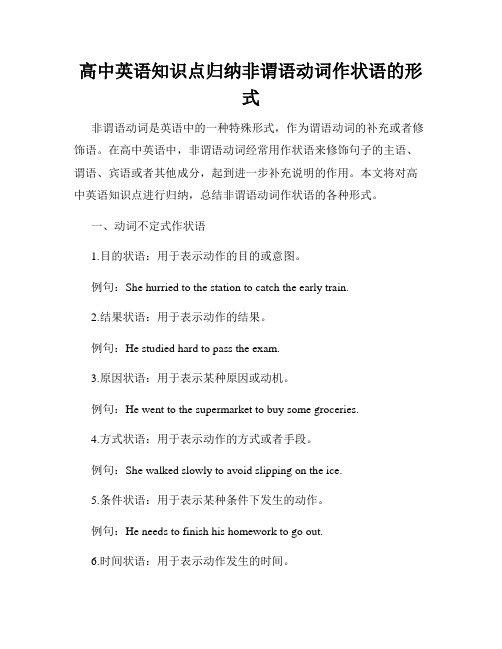
高中英语知识点归纳非谓语动词作状语的形式非谓语动词是英语中的一种特殊形式,作为谓语动词的补充或者修饰语。
在高中英语中,非谓语动词经常用作状语来修饰句子的主语、谓语、宾语或者其他成分,起到进一步补充说明的作用。
本文将对高中英语知识点进行归纳,总结非谓语动词作状语的各种形式。
一、动词不定式作状语1.目的状语:用于表示动作的目的或意图。
例句:She hurried to the station to catch the early train.2.结果状语:用于表示动作的结果。
例句:He studied hard to pass the exam.3.原因状语:用于表示某种原因或动机。
例句:He went to the supermarket to buy some groceries.4.方式状语:用于表示动作的方式或者手段。
例句:She walked slowly to avoid slipping on the ice.5.条件状语:用于表示某种条件下发生的动作。
例句:He needs to finish his homework to go out.6.时间状语:用于表示动作发生的时间。
例句:I woke up early to catch the sunrise.二、动名词作状语1.原因状语:用于表示某种原因或动机。
例句:She left the party, feeling bored.2.方式状语:用于表示动作的方式或者手段。
例句:He crossed the river, swimming.3.时间状语:用于表示动作发生的时间。
例句:She spent the whole afternoon chatting with her friends.4.伴随状语:用于表示动作的同时发生的状态。
例句:He walked down the street, whistling a tune.5.条件状语:用于表示某种条件下进行的动作。
高中英语知识点归纳非谓语动词作状语
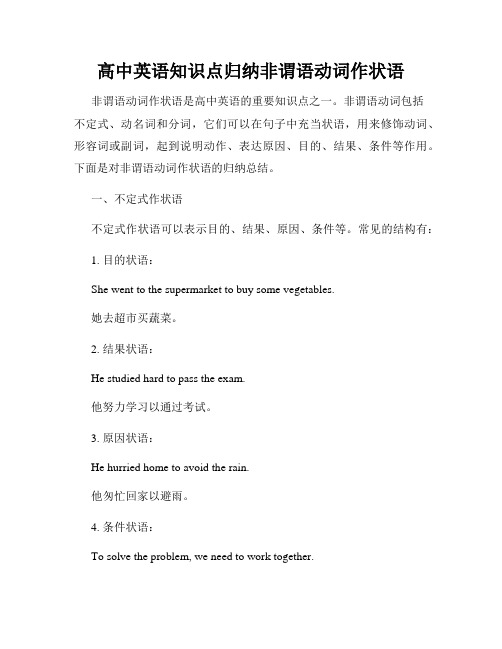
高中英语知识点归纳非谓语动词作状语非谓语动词作状语是高中英语的重要知识点之一。
非谓语动词包括不定式、动名词和分词,它们可以在句子中充当状语,用来修饰动词、形容词或副词,起到说明动作、表达原因、目的、结果、条件等作用。
下面是对非谓语动词作状语的归纳总结。
一、不定式作状语不定式作状语可以表示目的、结果、原因、条件等。
常见的结构有:1. 目的状语:She went to the supermarket to buy some vegetables.她去超市买蔬菜。
2. 结果状语:He studied hard to pass the exam.他努力学习以通过考试。
3. 原因状语:He hurried home to avoid the rain.他匆忙回家以避雨。
4. 条件状语:To solve the problem, we need to work together.为了解决这个问题,我们需要共同努力。
二、动名词作状语动名词作状语可以表示目的、结果、原因、时间、方式等。
常见的结构有:1. 目的状语:He practices playing the piano every day to improve his skills.他每天练习弹钢琴以提高技能。
2. 结果状语:She couldn't sleep, feeling worried about the exam.她无法入睡,对考试感到担忧。
3. 原因状语:They raised their voices, shouting for help.他们提高了声音,呼救。
4. 时间状语:Walking along the street, I saw an old friend of mine.走在街上的时候,我碰见了一个老朋友。
5. 方式状语:He solved the math problem by using a different method.他用不同的方法解决了这个数学问题。
非谓语动词作状语教案
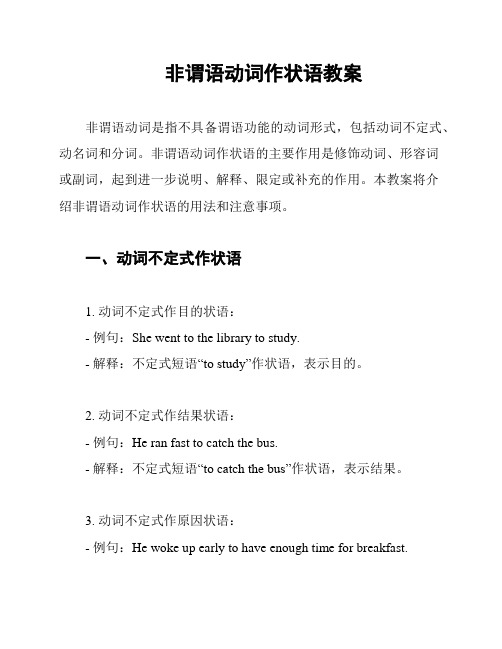
非谓语动词作状语教案非谓语动词是指不具备谓语功能的动词形式,包括动词不定式、动名词和分词。
非谓语动词作状语的主要作用是修饰动词、形容词或副词,起到进一步说明、解释、限定或补充的作用。
本教案将介绍非谓语动词作状语的用法和注意事项。
一、动词不定式作状语1. 动词不定式作目的状语:- 例句:She went to the library to study.- 解释:不定式短语“to study”作状语,表示目的。
2. 动词不定式作结果状语:- 例句:He ran fast to catch the bus.- 解释:不定式短语“to catch the bus”作状语,表示结果。
3. 动词不定式作原因状语:- 例句:He woke up early to have enough time for breakfast.- 解释:不定式短语“to have enough time for breakfast”作状语,表示原因。
二、动名词作状语1. 动名词作时间状语:- 例句:I enjoy swimming in the morning.- 解释:动名词短语“swimming in the morning”作状语,表示时间。
2. 动名词作原因状语:- 例句:She failed the exam due to not studying enough.- 解释:动名词短语“not studying enough”作状语,表示原因。
三、分词作状语1. 现在分词作时间状语:- 例句:Walking along the street, she noticed a bookstore.- 解释:现在分词短语“Walking along the street”作状语,表示时间。
2. 过去分词作原因状语:- 例句:Feeling tired, he decided to take a break.- 解释:过去分词短语“Feeling tired”作状语,表示原因。
- 1、下载文档前请自行甄别文档内容的完整性,平台不提供额外的编辑、内容补充、找答案等附加服务。
- 2、"仅部分预览"的文档,不可在线预览部分如存在完整性等问题,可反馈申请退款(可完整预览的文档不适用该条件!)。
- 3、如文档侵犯您的权益,请联系客服反馈,我们会尽快为您处理(人工客服工作时间:9:00-18:30)。
非谓语动词不定式和分词作状语一、不定式作状语可以作:1.主要用作。
常与连用。
so as to 不用于居首。
He got up early in order to catch the first bus. 。
He sat down to have a rest.He went to France to learn French。
2.状语。
表示的结果。
做结果状语的不定式只能出现在句子的He hurried to the station only to find the train gone.3.表示喜怒哀乐的形容词作表语其后的不定式作状语。
表示引起这种情绪变化的原因。
I’m sorry not to have come on Tuesday.I am very glad to see you.We are glad to hear the news.二、不定式做状语时应该注意:1.not/never too…to do, too…not to do, but/only too… to do, too ready to do, too eager to do表示肯定意义。
He is too careful not to have noticed that.I am only too glad to help you.I am only never too glad to know you. He is only too ready to help others, seldom, if ever, refusing them when they turn to him.2.不定式做状语时,其逻辑主语一般为,否则用for引导主语。
We studied hard to pass the exam. 不定式做目的状语其逻辑主语是we。
Li Ming’s mother went to the lecture hall early for him to get a good seat.三、分词作状语可以作:1.Hearing the noise, I turned round.Having done my shopping, I returned home.2.Not having received a reply, he decided to write again.Reading attentively,he forgot the time for lunch.3.Reading carefully,you'll learn something new.Working hard, you will surely succeed.4.They stood by the roadside talking about the plan.The boy sat in front of the farm house cutting the branch.He came running back to tell me the news.5.A lot of good land has gone with them, leaving only sand.A hurricane hit this area last night, blowing down a lot of trees.四、现在分词与过去分词作状语的区别。
He went out shutting the door behind him.Not knowing what to do, he went to his parents for help.Given more attention, the trees could have grown better.Faced with difficulties, we must try to overcome them.五、分词和分词短语在表示时间、原因、条件、让步和方式时,通常可转换为相应的状语从句;表示方式和伴随情况时,可以转换为一个并列的谓语成分。
Seeing the teacher entering the room, the students stood up.=When the students saw the teacher entering the room, they stood up.Being excited, I couldn’t go to sleep.=As I was excited, I couldn’t go to sleep.I stood there, listening to the broadcast.=I stood there and listened to the broadcast.六、分词作状语时前面可用连词。
when, while, once, if, unless, though等引导的状语从句,When (being) free,I’ll fetch you.If falling ill, I’ll see my doctor.Even though given every opportunity, they would not try.七、分词或分词短语作状语时,其逻辑主语必须与句中的主语1.Entering the room, I found the walls newly-painted.Entering the room,the first thing that met eyes was the newly-painted walls.2.Badly wounded, the soldier was sent to hospital at once.Badly wounded,we sent the soldier to hospital at once.3.Being very busy,I could not afford the time to go to the cinema.Being very busy,the film tickets were given to others.4.Led by the Party,we are making great progress in our work.Led by the Party,great progress in our work is being made.八、如果分词或分词短语作状语时,其逻辑主语不是句中的主语,1.The professor entered the lab,his students following him.2.A few seconds later,he was looking at the screen again with the machinery turned on.3.The day being very wet,Mary wore her new mackintosh.4.The authorities having arrived and taken the seats reserved for them,the ceremony began.5.He fell asleep with the lamp burning.九、有些现在分词和过去分词已具有的性质,由它们组成的词组作状语时其逻辑主语和整个句子的主语。
如:1.He couldn't attend the meeting owing to illness.2.According to the text,please answer the following questions.3.The boy did quite well considering the circumstances.4.Regarding the case,he knew nothing.经常这样用的分词有:admitting that(conj.confessing that,承认)assuming that(conj.if,假定)barring(prep.except,除……以外,除非)considering(prep.in view of...,having regard of...鉴于,就……而论)concerning (prep.about,关于)excepting(prep.&conj.leaving out,excluding,-often after not,always,without,除……之外,包括)failing(prep.in default of...,in the absence of...若缺少……时,如果没有)owing to(prep.because of...,on account of...,因为……,由于……)providing /provided that(conj.on condition that,假若,倘使)regarding(prep.with reference to...,about,关于,有关)seeing that(conj.in view of the fact that;considering,鉴于……的事实,由……的缘故)上述诸词有些已完全变成了介词或连词。
这些分词还有:provided (or provided that),providing that, supposing, seeing (that), considering等。
You can arrive in Beijing earlier for the meeting provided you don’t mind taking the night train. 如果你不介意搭夜班火车,你就能早点儿到北京开会。
I’ll go, providing you go too. 如果你去的话我就去。
Supposing it rains, what shall we do? 假如要下雨的话,我们怎么办?Seeing (that) she is old enough to get married, I don’t think you can stop her. 鉴于她已到结婚年龄,我看你阻止不了她。
Considering he has been learning English only for a year, he speaks it quite well.考虑到他学习英语才一年,他讲得相当不错。
十、ed(感到)形式及常见短语与ing(令人)形式形容词归纳:excited (be excited about) / excitingsurprised (be surprised at) / surprisingamazed (be amazed at) / amazingembarrassed (be embarrassed in) //embarrassingencouraged (be encouraged at / by) / encouragingfrustrated (be frustrated of) / frustratinginterested (be interested in) / interestingthrilled (be thrilled at) / thrillingterrified (be terrified at/ of / with) / terrifyingpleased (be pleased with) / pleasing, = pleasantsatisfied (be satisfied with) / satisfyingfrightened (be frightened at / of ) / frighteningtired (be tired of) / tiringbored (be bored with) / boringrelaxed (无固定搭配) / relaxingfascinated (be fascinated by) / fascinatingannoyed (be annoyed with) / annoyingmoved (be moved by) / movingworried (be worried about) / worryingconfused (be confused about) / confusinginspired (be inspired by) / inspiringlost (be lost in) /作状语时,句子的主语是人,直接用ed分词就可以了。
